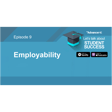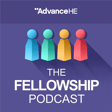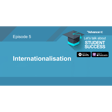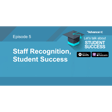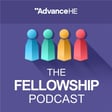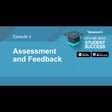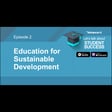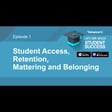Become a Creator today!Start creating today - Share your story with the world!
Start for free
00:00:00
00:00:01

Framework for Leading in Higher Education
Join host Aaron Porter to discuss the brand new Framework for leading in Higher Education, alongside special guests Shan Wareing, Vice Chancellor at Middlesex University, and Ben Calvert, Vice Chancellor at the University of South Wales.
Transcript
Introduction to the Leadership Framework Podcast
00:00:12
Speaker
and Welcome to this Advance HE podcast, exploring the new framework for leading in higher education. I'm Aaron Porter, Associate Director for Governance Advance HE, and I'll be hosting today's episode. And I'm delighted to welcome two special guests, Professor Sharm Waring and Dr. Ben Calvert, co-chairs of the steering group, which have helped Advance HE develop the new framework.
00:00:36
Speaker
Sian is Vice-Chancellor of Middlesex University and joined in April last year from the University of Northampton where she was Deputy Vice-Chancellor. And Ben is Vice-Chancellor at the University of South Wales.
00:00:48
Speaker
ah He joined USW in 2015 as Pro-Vice-Chancellor for Student Experience before becoming Deputy Vice-Chancellor in 2019 and has been Vice-Chancellor since September 2021.
Development and Focus of the Framework
00:01:01
Speaker
Well, thank you both for for joining me today to discuss this new framework for leading in higher education. And I understand it's been um a long time in the making. Well, it's probably been a long time as a twinkle in the eye. i actually think our steering group was was quite nippy because I think we formed about a year ago and we we set ourselves a time frame of, um first of all, exploring whether we thought a framework was needed and then what it might look like and consultation. And and i think I think we've rounded it up in about a year. So I think I actually think we moved at pace, um but certainly I think it's been a ah discussion that's been going on since before that. That's great, and the fact that it's you know been quick in its work through the steering group allows it to engage with some of the contemporary questions that the sector is facing. And I wonder if you might say a little to our audience about what the framework is and what the current conditions are that demand this as a solution.
00:01:56
Speaker
um So simply simply the framework is there to support leaders. It's there to support leaders at many different levels. So this isn't just about senior leaders, vice chancellors, executive teams.
00:02:08
Speaker
You know, this should be there to support leaders. And actually probably one of the concepts that we talked about quite a lot was the notion of distributed leadership um and actually the importance for that at a very disruptive moment in time. So I guess guess the reason for it is we are thinking quite hard as leaders about being custodians of our organisations in a really disruptive moment.
00:02:31
Speaker
And question mark, does that demand a a certain type of leadership or does it demand a ah different type of leadership?
Challenges and Skills for Leaders
00:02:37
Speaker
So I think many of us are facing into quite significant changes to our business models around higher education, how we make those work.
00:02:46
Speaker
um And we're trying to do that. It's like you're trying to fix the car while it's on the road. trying do that whilst also delivering you know great experiences to your students and making sure that the things that you value are ah maintained. So I do think there is probably a ah skill set around leadership that's in demand at this moment in time. And we've talked an awful lot about, say, distributed leadership, team team building, leadership within a wider ecosystem.
00:03:11
Speaker
And actually, how do you manage transformation where there are may be skill sets there that perhaps need to be tuned up in the sector? Yeah, I agree with all of that. I think we we were making sure, as as Ben said, there was a pipeline of leadership. So we're not just addressing, um you know, a top flank. We really want it right through the organisation.
00:03:31
Speaker
um i think a lot of what we need to deliver is actually delivered through the organisation. um and And we we also recognise that people are maybe... um coming up against complexity they haven't seen before.
00:03:43
Speaker
um So we did we did want something that worked right through the organisation. um And also, I'm sure we're going to talk more about this, but something that was applicable both in this country and globally, it was really important to us that it relevance.
00:03:55
Speaker
um ah And once we started that conversation, it was actually surprisingly difficult to get something that worked globally, but also maintain the level of relevance we were looking for in each individual country.
00:04:07
Speaker
So um it's um it's really quite a cross-cutting framework. I think something that that speaks to the contemporary challenges and then operates across those different dimensions, as you say, different levels of leadership, ah different geographies, and and and also that kind of um combined challenge of delivering change whilst also delivering business as usual within an organisation as well, as something that I think lots of us and lots lots of listening will will relate to.
00:04:35
Speaker
um Perhaps it would be helpful just to hear a little about your own um kind of ah leadership journeys and how that's informed your approach as co-chairs of of this of the steering group. Sian, I might start with you first.
00:04:51
Speaker
Yeah, well, thank you. um I guess I'm very conscious as I was applying for jobs, um I was trying to articulate my leadership style in ways that weren't necessarily um I didn't necessarily have um a common framework with the panels that I was applying to.
00:05:10
Speaker
So one of the challenges was to be able to understand my own leadership in a way I could explain for an interview panel, but also think about what their understanding might be so that I could sort of meet them in the middle.
00:05:22
Speaker
um And that, for me, what that meant was we didn't necessarily have common principles or common language. um to articulate what we're looking for in leaders. So that was, for me, that was part of the challenge of doing this and partly why I was interested. I thought, what would, um what will it look like if we can bring some extent of commonality when you're you're applying for a leadership position with how you explain your own leadership journey um in a way that the panel um ah grasps and, that it you know, they can see where you're coming from, basically.
00:05:52
Speaker
um And we also found that we we didn't have common language. And obviously that was exacerbated because we were, um looking across national borders. and We were really grateful for the people on the steering group who were um taking part at odd hours of of the morning or the night.
00:06:07
Speaker
um But it was it was really apparent that we might be using language in different ways. So I think one of the challenges was to bring some um level of commonality so that there would be a reference point that was stable in all our conversations.
00:06:21
Speaker
um I guess I also you know you develop skills as a leader and maybe nobody tells you ah what they're going to be. So one of the goals in the framework was to articulate for people who were maybe at the start of a leadership journey or not sure they wanted to um to move into senior leadership, what some of the steps would be so you could see a pathway ahead of you.
00:06:41
Speaker
um Because i I think probably, um probably felt like I was making it up as I went along at some points in my career. And I thought it it would it would be nice to feel there was a map you could have referenced to, even if it wasn't, even if you wanted to chart your own course to feeling that there was there was a map ahead of you that you were working with reference to.
Conscious Leadership and Framework Iteration
00:07:01
Speaker
That's really helpful, Sian. And the same for you, Ben. I wonder how your own approach and experience in leadership ah informed your your approach to this development. Thank you.
00:07:11
Speaker
So I think, firstly, think, I never stopped set out in my leadership career thinking that I was wanting to be a vice chancellor. ah You know, and I suspect actually that's true for for for many people.
00:07:22
Speaker
um You come to these things through through through challenge, through your response to challenge, through your interactions with people, through your ability to motivate and inspire, but also to listen an awful lot and to observe and to be very conscious of your leadership. And I think, you know, one of the things we talked about here, there's a kind of active nature in this framework of leadership, of being really conscious of that leadership.
00:07:48
Speaker
And I think, um um you know, leaders that that that listen to us as much as they as as they speak often are some of the best leaders. And I think we applied some of those,
00:07:59
Speaker
um those things to the act of co-creating a genuine act of co-creating a framework. And it felt like that. It felt like a ah piece of co-creation in in in in practice. And as a I guess the the key thing there is is we didn't know what the end point was. We found our way towards the end point and it was very iterative. Now, actually, that's actually quite a lot what like leadership should be um if you've got sufficient humility to recognize that actually the journey might be a bit scruffy and that there isn't necessarily a kind of perfect place to get to, but you find your way to somewhere really progressive.
00:08:34
Speaker
So i think we I think we did that and actually the framework iterated and changed as a consequence of that that challenge. And of course, Sian and I were were were chairs, but there were many people around that group that were a lot more expert than we were in the kind of theory and practice of leadership. We just happened to be leaders with experience, right? So I think it was it felt like ah an act of co-creation based on respectful humility. And actually, if you want to have decision making in your institution, which is based on diversity of opinion,
00:09:04
Speaker
then actually deploying leadership like that is really, really critical. So ah hopefully it will be a framework that will allow people to be conscious of their leadership and its impact on others.
00:09:17
Speaker
And that builds nicely to to what I was um thinking of as um ah why perhaps it was helpful to have a sector-specific framework, because there's there's lots and lots of literature and theory out there on leadership, you know, widely applicable across lots and lots of sectors. lots and lots of sectors But to do something that's um sort of built up ah in and out of HE, I wondered if that felt particularly important in its ah and in in the creation of ah of this framework.
00:09:47
Speaker
um yeah That was something we debated a lot because we didn't want to reinvent the wheel. um You don't have to go very far to before you fall over somebody else's leadership framework. um And, ah you know, as Ben said, there's there's a lot of expertise out there.
00:10:01
Speaker
So we spent a lot of time talking about will this add value and and how will it add value? and And I think what we were clear about was when we looked at other frameworks, in some way they didn't quite fit for the whole of our sector. And because our starting point was we We wanted to be able to have conversations in the sector about leadership. um We wanted to be able to have some kind of common core that was a reference point. we you know We wanted to have these maps for people to develop um and and to help people be the best leaders they could be.
00:10:31
Speaker
So we we part of the principle in in developing the framework was it was something that would make sense to this sector. um We talked a lot about relevance in the UK and relevance globally.
00:10:44
Speaker
We felt we had a lot to learn from other countries. We didn't want to be isolated. um We wanted to combine our understanding of leadership. And so that was important to us as well.
00:10:54
Speaker
And we also were aware that, of course, people have careers that go across national boundaries. So we felt there was something specific about HE in terms of values and the complexity of leading.
00:11:05
Speaker
yeah academics who are you know quite independent and and have an affinity to their discipline as well as their institution, and that that was common you know look globally, but also that universities are about professional services as well as academics. So there's very different styles of management and leadership expectations sometimes within institutions, um and that's part of the richness of higher education and why we love it, but also part of the complexity of thinking about leadership that um once you've you've come out of your channel, you know if you're moving up, that you're leading across different disciplines and and and professional services that may have ah different norms within them as well of of what's expected as from managers and leaders.
00:11:46
Speaker
So trying to articulate something that would work for this sector and didn't stop at national boundaries was really important to us. So that's what we've we've tried to do.
00:11:57
Speaker
And we're really conscious that leaders have to combine a business-like and professional approach with the values of HE, that we didn't want to lose the things that draw people into the sector, the sense of excitement about knowledge creation and helping other people develop, but at the same time, clearly with the financial pressures on us and also that we we all operate within legal frameworks, that there's a business-like element to that leadership.
00:12:21
Speaker
So our challenge was to bring those two together so they they could coexist harmoniously. And I think that really resonates with the sorts of conversations that institutions have when they are thinking about making senior ah appointments or all sorts of appointments.
00:12:36
Speaker
And similarly, how staff are also evaluating their own um progression. I mean, you know, we will hear ah regularly that there are things that are distinctive and quite special about higher education, that community, that place for generating new knowledge, for dissemination and for um co-created ah learning. in research informed environment.
00:12:58
Speaker
But there's also those wider considerations which may be more translatable to other sectors, the need to operate a sound ah business model, um to be um observant and compliant with the regulatory,
00:13:11
Speaker
a regime wherever we may be uh uh based to be thinking about how the organization is sort of fit for purpose and using technology these are things that will come in and out of our education and from from elsewhere um so that that learning from elsewhere but also built around something that that that speaks to us clearly ah makes a a a lot of sense Ben, I wonder if you might say, um we've touched on this, but say a little bit more about um who this framework is is for, who you're envisage envisaging using it and um thinking about it.
Global Relevance and Application of the Framework
00:13:45
Speaker
I mean, i would hope that there's a ah way into this for for anybody who is in a leadership position or indeed an aspirant leader in in higher education. As I say, think,
00:14:00
Speaker
for many people that the the course that's plotted for them is is is is not clear. So, as I said, I didn't start my off thinking that being a vice chancellor was there was the career path, but you end up on a path, right? so and And you know we are institutions that are are learning institutions. Our job principally is to help people grow.
00:14:21
Speaker
So actually having something which allows people at the beginning of their career to see a space for conversation and a space for dialogue, a space potentially for being mentored in that is really important.
00:14:34
Speaker
But I also do think that this framework does resonate at the the very senior end here, because I think going back to some of the points that Sian made, I think there are some really tricky things about how you locate institutions at the moment.
00:14:50
Speaker
And I think part of this is is' this tension that you have between marketised environment, an environment of competition, an environment where we're all having to think about the business and business models and this other purpose, you know, ah at a time when people are starting to perhaps realise more the that the the kind of national or regional asset that the institutions are, that they are anchor institutions in place, that they play a much broader civic role.
00:15:18
Speaker
And those things are not easily always compatible, actually, when you're having financial challenge. So how do you maintain a kind of balanced proposition so that as custodians of an institution, you're playing those purposes um down down the line? So I do think ah do think there is something in the framework, big because it's because it's quite complex when you read it, that invites you to think about actually quite complex dynamics that can be quite contradictory.
00:15:48
Speaker
And I think those things are there at very senior level, but they're also there, you know, whether you're a course leader and you're thinking about the impact of your course on a place, your impact of your ah provision for for people in your communities and so on. I think there is so there is that tension's explored there somewhere, even if it's not necessarily overt.
00:16:06
Speaker
Yeah, and um and the best institutions, as you say, are thinking about these sorts of dilemmas and and questions right through the organisation. The idea that this is the preserve of the management team or the or the governing body is is is is clearly false. It needs to be ah understood, debated and considered and applied right across the institution. So I think really um helpful to to to hear that.
00:16:30
Speaker
yeah so So one of the complexities in that is um ah how do leaders grow And what do leaders show in different roles? so So um we know that, you know, somebody could be in quite junior role relatively to a career structure, and but actually demonstrate exceptional leadership.
00:16:48
Speaker
um And people can also move through a a career and have missed out on certain kinds of learning and then find themselves sort catching up later um in areas that, um if I don't know, if I compare...
00:17:02
Speaker
um for example, subjects where you you work more in isolation or subjects that you work on complex projects. Coming out of those two disciplines, you might have more experience of leading teams than others by the time you get into a leadership role.
00:17:15
Speaker
um So we were we were really conscious of being able to recognise leadership wherever it happened, but also help people round out their leadership at whatever point in their career they came to the framework.
00:17:28
Speaker
um So I think that's one of the things we hope we've achieved. So we we genuinely hope it's for everybody. And it would give it would at least start conversations, even if it didn't give people a complete structure to articulate what they see as their own leadership style.
00:17:43
Speaker
It would give a common structure to have those conversations and therefore advance the whole sector because our conversations about leadership could become more sophisticated. Shana, I wonder, I think we've offered some examples of this in our in our conversation so so far, but I wonder if there was any anything that you had in mind that will enable this framework to to stand out, anything that will particularly um you know make it something that people will want to turn to? Yeah, well, I certainly think that leadership that works most successfully, um as if you come up an academic career route, isn't necessarily the leadership
00:18:20
Speaker
um which is your go-to style if you've come up professional services. And I've had a chance to do to do both. my My first job was as an academic. um And then I moved into a professional service role um with library, IT, t education development, um and um became a pro-vice-chancellor learning and teaching without having line managed as a dean, without faculty experience. So then I had to establish my credibility leading academics you when my um direct experience was line managing in professional services.
00:18:52
Speaker
um And I just as a, for what it's worth, I've also been a chief operating officer and line managed all professional services. And I've been a deputy vice chancellor and line managed all the the faculties. um And of course, there's things in common about the way you lead people and support their development and morale and um you know plan budgets and plan strategies. But I think there are also um variations when you're trying to get the best out of people who have um
00:19:23
Speaker
had had different educational experiences and are probably trying to achieve different things in an organisation as well. you know Some people are there because they are managing a process very tightly that has to be done very accurately and some people are there because they're creating knowledge at at the forefront of an area um where where they know that they're doing world leading activity that hasn't been done before.
00:19:46
Speaker
So they are they're working in different environments within within one institution. But for the whole institution to work for the benefit of students and staff, you want to be able to hold those different kinds of activities together.
00:19:58
Speaker
So that's one of the things our framework was trying to do. um We thought it could be used for staff development. So you could you could be looking at it and and thinking, are these areas I've been able to develop or not? or would I be interested in developing them?
00:20:11
Speaker
um We could use them for job descriptions and we could use them for interviews. So I also thought it might be something that somebody would, if they were preparing for an interview, they might use it as a framework for thinking, how am I going to articulate what I can achieve against all of this framework?
00:20:27
Speaker
So we we thought it could be used by everybody. we thought it could be used at all stages of careers. um And as I said, if if people look at it and they think that doesn't articulate what I want to articulate, that is actually part of a conversation about us all becoming um more familiar with ways of talking about leadership.
00:20:45
Speaker
Perhaps if I could, do if you wouldn't mind me just adding something there. um I also think there's something about the complexity and the comprehensive nature of the framework, which I think is important. We had quite a lot of discussions about our own leadership development that we've been on as leaders.
00:20:58
Speaker
ah My experience of it, I've had some great leadership development, but my experience of it is that we um we often focus on certain aspects of leadership in terms of, you know, personal qualities of leadership,
00:21:12
Speaker
David Sloan- Individual styles team building and so on and so forth, so i've been through an awful lot of that, but there were also things that we discussed in this that were. Sloan- we're not present so much in some of that development work so actually, for example. David Sloan- How do you um how to create a strategy, how do you how do you locate your institutions strategically in a wider context, how do you think about an ecosystem that you're based in where you're working with others both competitively and collaboratively and how does that work.
00:21:41
Speaker
um So I think there were things in there that were werere not often taught. oh Those wouldn't necessarily be things that I would say were um were aspects of leadership that I had experienced in development previously.
00:21:56
Speaker
So there was something about the comprehensive nature of this. And I think that stuff, by the way, is probably more difficult. that's that's really That's really quite tough. How do you make effective decisions? How do you avoid biases? How do you use teams to do that?
00:22:10
Speaker
ah These are not things that are often taught. So I do think it's comprehensive and it's complex and it's necessarily complex because we're in a complex environment. ah One of those other dimensions that's seen as quite complex um right now, but I think has always had a degree of challenge to it, is um of is is good governance.
Governance and Institutional Alignment
00:22:30
Speaker
And there's lots of discussion about um how effective the sector's governance is ah right now in responding to some of the more contemporary challenges. And I wondered if you had thoughts on um how this framework might contribute to sector's good good governance. and Yeah,
00:22:49
Speaker
but perhaps if I can start there if it's okay. We had actually, we had this discussion. So one of the stakeholders that we hope that is going to be interested in this framework is governors, because actually if you're in a governing body, you're a custodian, you should be a custodian actually of leadership for your institution over a period of time.
00:23:07
Speaker
You're custodian of its mission, you're custodian of its strategy, but actually what the key influencer there is to make sure that leadership is well aligned to that. Um, um And I have seen, you know, examples in the sector where where you get like leadership disjunctures, perhaps, between, you know, one leader that that has a particular view and then you see in the same institution another leader that's got quite a different style and a different approach.
00:23:29
Speaker
That seems to me to be strange in the context of that custodian role. um So I do think governors should be interested in this and actually should be thinking a lot about leadership and they should be thinking a lot about how they have ah how they have continuity if they have disjunctures and they need to be they need to be really deliberate ones right based on a good reason um so I do think that governing bodies should be thinking about their role as being custodians of good leadership in their institutions and this framework can help them do that so I would think they will be one of our stakeholders that we would want to be interested
00:24:06
Speaker
Yeah, I agree with what Ben said. I often use the word stewardship. I think we're you know we're here as leaders for a short amount of time in the the history of an organisation. And our job is to um both protect the things that we value in it and um also ensure that they can thrive in an environment that we haven't seen before. Because obviously, you're always the the environment is always changing.
00:24:28
Speaker
um But I'm also relatively recently appointed vice-chancellor. And I would hope the governing body would be using this framework when they are thinking about the job description of the vice chancellor, having conversations with the headhunters about what they're looking for, maybe talking to the rest of the organisation when they're consulting on what they want in the VC, that people have got this framework for reference to say, we want yeah we'd we'd like to see more of this, for example.
00:24:53
Speaker
um And then you know setting objectives for VCs. It's a way of having a conversation about professionalising leadership, I think, where the board can um just just be in dialogue with their executive leadership about what they're looking for.
00:25:08
Speaker
um And you obviously, as Ben said, we're learning organisations. The point is to support people to be the best leaders they can be. And that's what we all want from our HE leadership.
00:25:20
Speaker
but That certainly resonates with with me, um both both as a governor of two universities and also with the with the work that we do at Advance HE with university and governing bodies. I find often they're relatively comfortable in the space around sort of strategy development and oversight of regulation and performance monitoring. But that conversation approach to leadership is something ah where often it's quite quite a um ah ah tricky area sometimes to to navigate, particularly as lots of governors often come from very um significant and established executive careers themselves.
00:25:55
Speaker
But actually thinking about it from a non-executive ah space ah means that they're having to think about it in a in a different way. And I think therefore being able to apply something like this in their conversations with the vice chancellor and their executive teams around the board I think will be, as you say, really helpful and hopefully something that they'll they'll want to want to take up.
00:26:18
Speaker
um Just thinking now about how how this will hopefully be applied and and used by ah by by institutions.
Global Dissemination and Future Evolution
00:26:25
Speaker
um you know, ah it's being shared um ah with with the sector, and i I talk about the sector in a global sense ah here, and hopefully institutions will be applying it in in in slightly different ways.
00:26:38
Speaker
um ah But but so I wonder, um just sort of from a kind of practical at level, um are you you talked about the different ways it might be used by different sorts of people, so I guess there's not a one-size-fits-all expectation about how it's going to to be used. Have you any thoughts about um just what you how on ah how you're hoping it's going to be sort of taken up, Sian?
00:27:02
Speaker
Thank you. Well, I think this is where it gets exciting actually. We're really interested to see how people respond to it. um it It will only be working if it evolves and it will evolve through use. um So we're looking, really interested to see how that happens. So we're hoping um that it will connect to, we're hoping it will resonate with the sector, obviously, and people will find it useful.
00:27:24
Speaker
um But we're also looking to see how people use it and how it changes as a result of that, perhaps with research. So people are listening and they're engaged in research activities in this area, I know Advance HE will be really interested to hear about that, um to hear about that knowledge and understanding um and any evaluation that's going on.
00:27:45
Speaker
um and to feed it into future iterations, but also how we explain and present what we've got now. um you know we're We're engaged now in a dialogue too to launch it and we expect, um ah as it settles in the sector, for us to be able to refine how we explain it to future generations of leaders. So as well as um potentially refining the framework, we would be refining how we we shared it and explained it. So all of the feedback is really useful.
00:28:13
Speaker
and And certainly I know that from a you know other advanced HE activity and indeed the things that are most well ah regarded and frankly most utilised by practitioners, ah you know that there is this sense that here's how it's useful to me now, here's what's been particularly valuable, but here's how it might want to change over time. And and actually until it starts to get used, we won't get that feedback. But ah you know I know that there's a real keenness to to hear that and inform future future iterations.
00:28:41
Speaker
ah Well, this is, as you say, a really exciting time, um both um for the launch of this framework, but also now the crucial point of seeing how it's going to be utilised. ah The changes that I hope it will help enact, the support and the development that I hope it will help to um put forward and crucially help organisations and its people to become more effective.
00:29:05
Speaker
So on that note, I really want to say a huge thank you to Sian and to Ben for your time, not just today, but more importantly, with members of the steering group and with the wider conversations you've had in the development of this of this framework.
00:29:18
Speaker
I really hope that colleagues will agree it will be something that they will find useful for them personally, but also for their teams and for their organizations. and we will see ah that it gets utilisation and the support that I think we're all excited to to see.
00:29:34
Speaker
So if you've got any ah comments or questions or um feedback that you'd like to provide, then we'd be delighted to hear that from you. And of course, um please do check out ah that the framework the framework for leading in higher education by visiting the website advance.org.
00:29:51
Speaker
advance That's all for now. Thank you very much. higher education that's all for now thank you very
